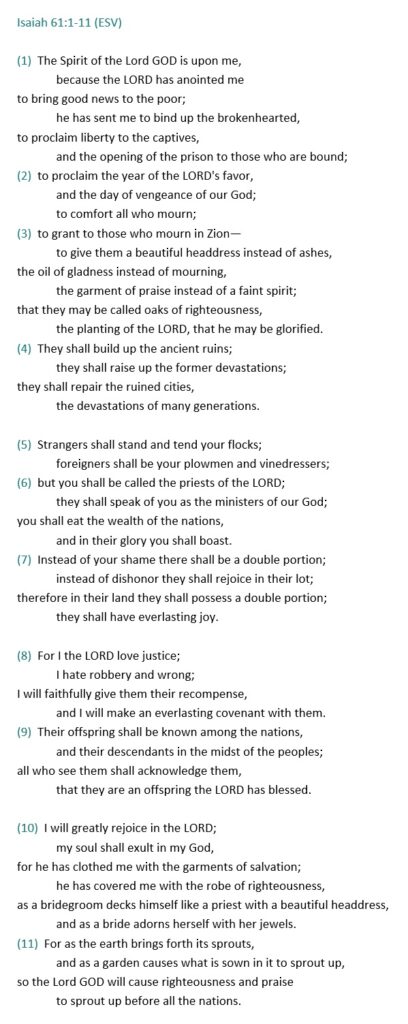In short
A very hopeful poem of God’s goodness to come. (Spoiler alert – it’s through Jesus Christ.) If you have ever felt down and out and long for when God will make it all right, this poem will make you smile.
I chose this poem for this week because of its tie to Leviticus – on Friday we are discussing “the year of jubilee” (Lev 25), which ties to verse 1 of this chapter.
Why it is important
Jesus quotes it. In Luke 4:16-22, Jesus reads the first few verses in the synagogue on the Sabbath and says, “Today this Scripture has been fulfilled in your hearing.” (In other words, “I am the messiah.”)
What is in this poem
There are apparently two and possibly three different speakers in the poem.
- Verses 1-7: The messiah proclaiming that he is the LORD’s messenger
- Verses 8-9: The LORD himself speaks
- Verses 10-11: The messiah, or maybe someone else, praises the LORD*
There are mentions of the vengeance of the LORD, that he will punish those who have done evil to Israel (verses 2 and 8). Verse 5 also seems to imply a reversal – where you were serving others before, now they will serve you.
But for the most part, the poem is just about the goodness to come. That people will be free (v. 1), comforted (v.2), restored (v.4), not burdened (v. 5-6), prosperous (v.6), and have an inheritance (v.7).
And over and over, the point is that the people’s greatness will cause others to say, “What a great God you serve.” The glory goes to God.
- “the year of the LORD’s favor,” v. 2
- “the planting of the LORD, that he may be glorified,” v. 3
- “they shall speak of you as the ministers of our God,” v. 6
- “all who see them shall acknowledge them, that they are an offspring the LORD has blessed,” v. 9
- “the Lord GOD will cause righteousness and praise to sprout up before all the nations,” v. 11
Theology and doctrine
This poem is just overflowing with prophecies of Christ and the church.
- Verse 1, “to bring good news” = the gospel
- Verse 6, “you shall be called the priests of the LORD” = 1Pe 2:9
- Verse 8, “I will make an everlasting covenant with them”
- Verse 7 hints at a promised inheritance
- Verse 11, “righteousness and praise to sprout up before all the nations” hints at the gentiles being called by the gospel

Footnote
* I would argue verses 10-11 is about the saved people, since they are being clothed as the messiah promised in the first section. But others argue it is the messiah again.

No responses yet